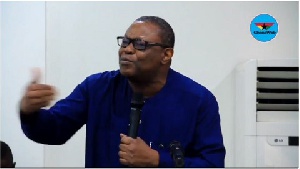Emmanuel Bombande, the Senior United Nations Advisor, has said it is important to perceive research as the avenue for marshalling political capital, to build consensus to enhance decision-making and implementation.
He said: “There is no argument that the quality of research serves several functions in a given policy-making situation”.
Mr Bombande, also a former Deputy Minister for Foreign Affairs and Regional Integration under the former President John Mahama regime, said this at the just-ended Migrating Out of Poverty (MOOP), a research Consortium West Africa Regional Dissemination workshop in Accra.
He said there is the need for African leaders to give back the citizens their dignity by re-considering reshaping policies on migration, adding that “policy must be geared towards improving peoples’ welfare and not to the benefit of the politician”.
The workshop, which served as a wrap-up meeting for the project which was started over ten years ago, was attended by Ghana, Kenya, South Africa, Senegal, Zimbabwe, Ethiopia and United Kingdom.
The MOOP research project looked at the relationship between migration and poverty with the focus on reducing the negative aspects of migration whiles increasing the positives sides as well.
It was funded by Department for International Development (DfID), United Kingdom and was coordinated by University of Sussex, United Kingdom with the Centre for Migration Studies (CMS), University of Ghana, Legon as the implementing institution for Ghana project
The CMS conducted three researches within the project period and they are “Incomes and Remittances”, “Gender and Generations” and “The Migration Industry”.
Mr Bombande said it is the institution behind research that gives credibility to findings and integrity of how that research could influence policy decision and that should not be taken for granted.
“It is about time to use research to optimise the value for policy makers to understand that people’s mobility is good for Africa. Since we are talking in context of Africa, that is not generosity when we open our borders but to reduce illegal migration in our region, our continent before we engage elsewhere,” he added.
He said technocrats and academia need to be assertive and should not allow the politician to set the agenda for them and urged them to find ways to allow people to find out the balance between what they are bring on board and that of the politicians to vindicate themselves.
“Ghanaians should say that we have technocrats who are firm and assertive,” he said adding that “there is too much space for the politician to operate” and urged the technocrats to take their rightful positions on research policies and strategies.
Mr Bombande said: “A bold decision is about opening your borders for other citizens to be able to have access and validate research. A bold decision is being undertaken; it is for the good of the ordinary people, peace and security and also for the good of economics for development and growth”.
He urged researchers to focus more on how to use research to empower the youth to see their wellbeing in their communities and not elsewhere.
“We know how partnership and networks inspire one another or encourage one another and allow the quality of research to continue to improve, based on concrete and practical experiences on the ground with people.
“I think the more people do that, the whole world would appreciate the quality of the research from the feedback we get as we work, where it matters most, to the people in our communities.”
Professor Mariam Awumbila, the Coordinator, MOOP Research Consortium, said one of their research findings revealed that contrary to the migrant smuggling and human trafficking discourse which portrays migrants as playing a passive role in setting their own migratory agenda, migrants are active participants in the migration decision making process.
The research also revealed that while recruitment agents and other actors in the migration industry play a part in reinforcing and representing structures of inequality and perpetuating exploitation, they are an important part of migrants’ strategies to navigate through restrictive migration regimes and to realise their migration aspirations.
Professor Awumbila said the issues of exploitation and abuse highlighted in the two migration corridors are in part a result of a weak regulatory framework and called for an effective labour migration governance system, characterised by responsive legislative and regulatory framework and which recognises the complexities of the migration industry to address the issues highlighted.
General News of Sunday, 1 September 2019
Source: ghananewsagency.org
Research should be seen as avenue for marshalling political capital - Bombande
Entertainment
















